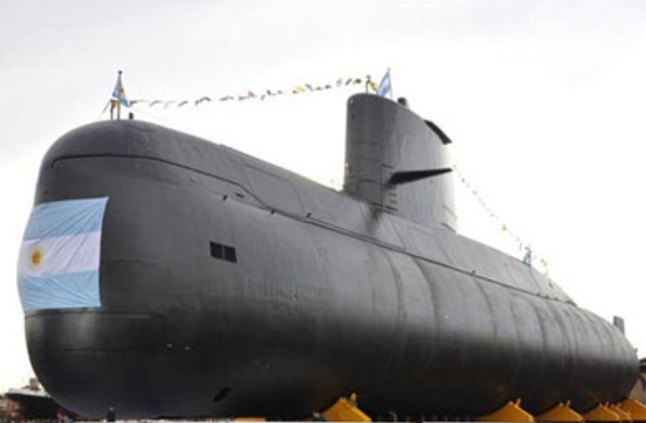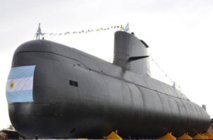"The only thing I ask is that we are not left alone, because after this, we don't know what will happen. Everyone comes to help in the beginning, but afterwards, we are left alone," Jessica Gopar tells journalists.
Her husband, 35-year-old electrician Fernando Gabriel Santilli, was on board the ARA San Juan, which disappeared on November 15 and is now thought to have blown up while travelling from the southern port of Ushuaia to Mar del Plata.
"Today is the first day I decided to come to the [naval] base, and I have just found out that I'm a widow," sobs Gopar, who carries a picture of herself with her husband and another of their 11-month-old son.
Gopar did not come earlier, because she feared it would depress her to see the anguish of other family members of the crew who have been at the base since the submarine went missing.
The area near the entrance is packed with journalists and cameramen. Cars bring in relatives who often do not want to talk.
Two girls pass by in silence, their arms around each other, tears flowing down their cheeks. Further away, a man and a woman are holding each other in silent embrace.
Some of the visitors to the base are not related to the crew. Encouraging messages, such as: "Strength, guys!" have been left near the entrance.
One group is holding prayers for "the 44," as they have become known, in a reference to "the 33" Chilean miners who were trapped for 70 days and rescued alive in 2010.
Locals and visitors join the prayer. But fewer outsiders are now to be seen, as if they wanted to show respect for the mourning family members after the news of the possible explosion broke.
A short, violent and "anomalous" non-nuclear event "consistent with an explosion" was registered near where the submarine went missing, the navy said.
Gopar says she is angry at "God, because he did not open the waters so they could get them out of there."
Others are showing a lot more anger. "They killed them! They killed my son!" one man yelled from his car.
Some relatives of crew members accuse the authorities of having initially withheld the news about the explosion, of having started the rescue operation late, and of not having paid attention to a technical problem that the ARA San Juan already had in 2014.
"Those perverse wretches manipulated us," said Itati Leguizamon, the partner of one of the crew members.
Argentinian Foreign Minister Jorge Faurie expressed "solidarity" to the families. But such statements will not bring Gopar's husband back.
"They have just told me that a submarine blew up and I don't know if I will have a flower to take to my husband's grave," she says.
Her only consolation is the expectation that the families of the crew will unite in a search for justice. "This will not end here," she vows.
"We will unite and something will come out of this, justice must be done. I don't need a plaque dedicated to 'the heroes of San Juan'."
Her husband, 35-year-old electrician Fernando Gabriel Santilli, was on board the ARA San Juan, which disappeared on November 15 and is now thought to have blown up while travelling from the southern port of Ushuaia to Mar del Plata.
"Today is the first day I decided to come to the [naval] base, and I have just found out that I'm a widow," sobs Gopar, who carries a picture of herself with her husband and another of their 11-month-old son.
Gopar did not come earlier, because she feared it would depress her to see the anguish of other family members of the crew who have been at the base since the submarine went missing.
The area near the entrance is packed with journalists and cameramen. Cars bring in relatives who often do not want to talk.
Two girls pass by in silence, their arms around each other, tears flowing down their cheeks. Further away, a man and a woman are holding each other in silent embrace.
Some of the visitors to the base are not related to the crew. Encouraging messages, such as: "Strength, guys!" have been left near the entrance.
One group is holding prayers for "the 44," as they have become known, in a reference to "the 33" Chilean miners who were trapped for 70 days and rescued alive in 2010.
Locals and visitors join the prayer. But fewer outsiders are now to be seen, as if they wanted to show respect for the mourning family members after the news of the possible explosion broke.
A short, violent and "anomalous" non-nuclear event "consistent with an explosion" was registered near where the submarine went missing, the navy said.
Gopar says she is angry at "God, because he did not open the waters so they could get them out of there."
Others are showing a lot more anger. "They killed them! They killed my son!" one man yelled from his car.
Some relatives of crew members accuse the authorities of having initially withheld the news about the explosion, of having started the rescue operation late, and of not having paid attention to a technical problem that the ARA San Juan already had in 2014.
"Those perverse wretches manipulated us," said Itati Leguizamon, the partner of one of the crew members.
Argentinian Foreign Minister Jorge Faurie expressed "solidarity" to the families. But such statements will not bring Gopar's husband back.
"They have just told me that a submarine blew up and I don't know if I will have a flower to take to my husband's grave," she says.
Her only consolation is the expectation that the families of the crew will unite in a search for justice. "This will not end here," she vows.
"We will unite and something will come out of this, justice must be done. I don't need a plaque dedicated to 'the heroes of San Juan'."









 Home
Home Politics
Politics











